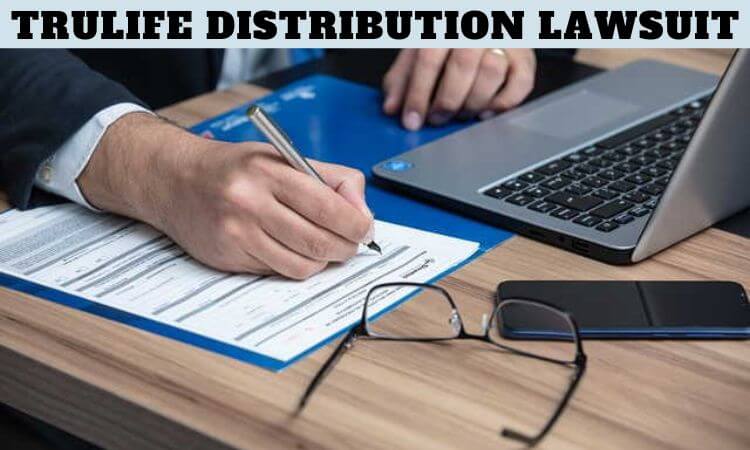Trulife Distribution Lawsuit: A Deep Dive into Business Ethics and Legal Battles

In recent years, the business world has seen a growing number of lawsuits that highlight the complex intersection of business ethics, corporate responsibility, and legal obligations. One such case that has captured attention is the Trulife Distribution lawsuit. This legal battle brings to the forefront significant questions about corporate behavior, intellectual property rights, and the legal ramifications of business practices in highly competitive industries. In this article, we will examine the Trulife Distribution lawsuit in detail, explore the underlying ethical concerns, and assess the broader implications for businesses and consumers alike.
Background of Trulife Distribution
Trulife Distribution is a well-known company in the health and wellness industry, specializing in the distribution of fitness-related products, including supplements, fitness equipment, and accessories. As a major player in this highly competitive market, Trulife is known for its aggressive marketing strategies and the cultivation of strong relationships with suppliers and retailers. However, as is often the case with rapidly growing companies, the pressure to maintain a competitive edge can lead to questionable business practices.
The lawsuit in question centers on allegations of intellectual property theft, breach of contract, and unethical business practices. While the exact details of the case vary depending on the specific claims being made, it appears that Trulife Distribution is being accused of unfairly taking advantage of its business partners, competitors, and even its own customers. The legal battle highlights issues that are common in the business world today, such as the protection of trade secrets, the integrity of corporate relationships, and the role of corporate responsibility.
The Allegations: Intellectual Property Theft and Breach of Contract
At the heart of the Trulife Distribution lawsuit is a series of allegations involving intellectual property (IP) theft and breach of contract. Several companies have claimed that Trulife misappropriated proprietary formulas for dietary supplements and other products without permission, using them to create competing products or undercut the original creators. This type of behavior can have serious legal consequences, as intellectual property theft is a violation of both civil and criminal law.
In addition to the IP theft allegations, Trulife is also facing accusations of breaching contractual agreements with suppliers and business partners. Specifically, some companies claim that Trulife failed to honor the terms of distribution contracts, leading to significant financial losses. Breach of contract is a common issue in the business world, but the consequences for businesses that engage in such practices can be severe, including reputational damage, financial penalties, and potential long-term impacts on future business relationships.
The Ethical Questions Raised by the Lawsuit
While the legal aspects of the Trulife Distribution lawsuit are critical, the case also raises several important ethical questions. One of the central issues is the extent to which businesses should be held accountable for their actions in the marketplace. In today’s hyper-competitive business environment, companies are often tempted to bend or break ethical rules in order to maintain profitability. The Trulife case serves as a stark reminder that ethical lapses can have far-reaching consequences—not just for the companies involved, but also for consumers, employees, and society at large.
1. Intellectual Property and Innovation: The allegations of intellectual property theft underscore the tension between innovation and protectionism in business. On the one hand, businesses need to protect their intellectual property to ensure that their innovations are not copied by competitors. On the other hand, the need for constant innovation can sometimes lead to unethical behavior, where businesses cut corners or exploit the work of others. This balance is a delicate one, and the Trulife case forces us to reflect on how intellectual property laws should be applied in an increasingly globalized and fast-paced business world.
2. Corporate Responsibility and Ethics in Contractual Relationships: The breach of contract allegations point to the ethical considerations involved in corporate relationships. When companies fail to meet their contractual obligations, it undermines trust and harms the broader business ecosystem. Ethical business practices should go beyond legal compliance to encompass fairness, transparency, and respect for all parties involved. The Trulife lawsuit raises the question of how companies can balance aggressive business strategies with ethical conduct.
3. Impact on Consumers: Perhaps the most significant ethical concern in this case is the potential harm to consumers. If Trulife’s alleged actions resulted in the distribution of subpar or potentially unsafe products, consumers would bear the brunt of these unethical practices. In industries such as health and wellness, where consumer safety is paramount, the ethical obligations of companies to provide safe, effective products are non-negotiable.
Legal Ramifications and Precedents
The Trulife Distribution lawsuit also serves as a critical case study in the broader legal landscape. It raises important questions about the enforcement of intellectual property rights, the penalties for breach of contract, and the potential for class-action lawsuits in the business world. The outcome of this lawsuit could set significant legal precedents, especially in the context of the health and wellness industry, where IP theft and unfair competition are common.
Additionally, the case highlights the need for businesses to carefully review their internal practices and ensure compliance with all applicable laws. Companies must be vigilant about protecting their own intellectual property while respecting the IP of others. Failure to do so can result in costly litigation, as well as long-term damage to the company’s reputation.
The Broader Implications for Business Ethics
The Trulife Distribution lawsuit underscores the importance of ethical conduct in business operations. Companies that prioritize profit over ethical considerations risk alienating their customers, losing their competitive advantage, and facing legal consequences. In an era where consumers are increasingly aware of corporate malpractices, businesses cannot afford to disregard ethical standards.
Moreover, this case serves as a cautionary tale for other companies operating in highly competitive markets. It demonstrates that unethical practices, even if they seem to provide short-term gains, can have serious long-term repercussions. Ethical business practices, on the other hand, foster trust and long-term success.
Conclusion
The Trulife Distribution lawsuit offers a fascinating look into the intersection of business ethics, legal accountability, and corporate responsibility. As the case continues to unfold, it will likely have lasting implications for how businesses approach intellectual property, contract law, and consumer safety. Ultimately, the case reinforces the importance of ethical conduct in maintaining a healthy and sustainable business environment. Companies must remember that their actions have consequences, not only for their bottom line but also for their reputation, their stakeholders, and the broader marketplace.
FAQs about the Trulife Distribution Lawsuit
1. What is the Trulife Distribution lawsuit about?
The Trulife Distribution lawsuit centers on allegations of intellectual property theft, breach of contract, and unethical business practices. The company is accused of misappropriating proprietary formulas for dietary supplements and other products, and potentially using them to create competing products. Additionally, some suppliers and business partners have claimed that Trulife breached distribution contracts, leading to financial losses.
2. What are the main allegations against Trulife Distribution?
The main allegations against Trulife Distribution include:
- Intellectual Property Theft: Trulife is accused of stealing proprietary formulas for products like dietary supplements and using them for their own benefit without permission from the original creators.
- Breach of Contract: Trulife is also accused of violating distribution agreements with suppliers and business partners, causing financial harm.
- Unethical Business Practices: The company allegedly engaged in unfair business practices, such as undercutting competitors or exploiting business relationships for its gain.
3. How is the lawsuit impacting Trulife Distribution?
The lawsuit has resulted in legal and reputational challenges for Trulife Distribution. If the allegations are proven true, the company could face significant financial penalties, a loss of consumer trust, and long-term damage to its brand. The lawsuit also underscores the potential legal risks companies face when engaging in unethical business practices.
Also Read: JobDirecto: Your Ultimate Guide to Finding Your Dream Job
4. What ethical concerns does the Trulife lawsuit raise?
The lawsuit raises several important ethical concerns, including:
- Intellectual Property and Innovation: The case highlights the ethical implications of using proprietary information without permission and the balance between innovation and protecting intellectual property.
- Corporate Responsibility: Trulife’s alleged breach of contract points to the importance of maintaining ethical, transparent business relationships with partners.
- Consumer Safety: If Trulife’s alleged actions resulted in substandard products being distributed, consumers could be harmed, raising ethical questions about a company’s responsibility to ensure safety and quality.
5. Could the Trulife lawsuit set legal precedents?
Yes, depending on the outcome of the case, the Trulife lawsuit could set important legal precedents, particularly regarding the enforcement of intellectual property rights and the legal consequences of breach of contract in the business world. It could also affect how courts handle issues related to business ethics and unfair competition in industries such as health and wellness.
6. How could this lawsuit affect the health and wellness industry?
The outcome of the lawsuit could have broader implications for the health and wellness industry, particularly around the enforcement of intellectual property protections and business practices in product distribution. If Trulife is found guilty of unethical conduct, it may prompt other companies to tighten their own internal policies on intellectual property, contracts, and consumer safety to avoid similar legal issues.
7. What are the potential legal outcomes for Trulife Distribution?
The legal outcomes for Trulife Distribution depend on the specifics of the case and the evidence presented. If the company is found guilty, it could face significant financial penalties, including damages to the affected parties and potential compensation for breach of contract. Trulife may also be required to stop selling certain products, and the case could lead to stricter regulations within the industry.
8. What should businesses learn from the Trulife lawsuit?
The Trulife lawsuit serves as a cautionary tale for other businesses, highlighting the risks of unethical business practices, particularly regarding intellectual property theft and breach of contract. Companies are reminded of the importance of transparency, respecting business relationships, and adhering to legal and ethical standards. This case also underscores the importance of protecting intellectual property and ensuring that all business practices prioritize consumer safety.
9. How is the lawsuit being handled in court?
As of now, the lawsuit is ongoing, and the legal process is unfolding. The court will review evidence, hear from both parties, and make decisions based on applicable laws surrounding intellectual property, contracts, and business ethics. The final verdict could have wide-reaching consequences for Trulife Distribution and the broader business community.
10. What can consumers do in light of the Trulife lawsuit?
Consumers should stay informed about the developments in the Trulife lawsuit, especially if they have purchased products from the company. If there are concerns about product safety or quality, consumers may consider contacting relevant regulatory bodies or seeking refunds. Additionally, this case highlights the importance of being discerning when purchasing from any company, especially in industries where consumer safety is paramount.
